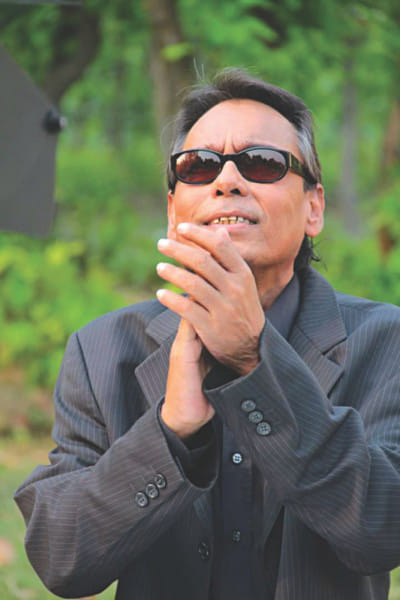Humayun Faridi - A man of unmatched impact

In his early life, Faridi was a bit of a lost child. He had joined Dhaka University in 1970, but after the Liberation War broke out, he went to fight for his country and even after the country was liberated he did not return to his university. After a five-year gap, he took admission at Jahangirnagar University, and that is where he found direction. In an intra-university drama competition, he wrote, directed and acted in the winning production “Attostho O Hironmoyider Brittanto” that struck a chord with a jury member, Nasiruddin Yousuff. It is through Yousuff that Faridi took his first steps on the stages of Dhaka, with the powerhouse troupe Dhaka Theatre. After working in street play “Char Kakra'r Documentary”, his first role was as a stop-gap in a small role for “Sangbad Cartoon”. Thespian Selim Al Deen, who was also the house tutor of the Al-Beruni Hall of Jahangirnagar University where Faridi resided, then read “Shakuntala'r Dwitiyo Porbo” to him, and Faridi took on the role of the 'Sharparaj Tokkhok' in the play.
After that, there was no looking back. “Foni-Monosha”, “Kittonkhola”, “Keramat Mangal”, the rebooted “Sangbad Cartoon”, “Muntasir Fantasy” – play after play Faridi drew the spotlight on to him, in a group that featured the likes of Raisul Islam Asad, Pijush Bandopadhyay, Afzal Hossain, Suborna Mustafa and Zahiruddin Piar. “Bhoot”, which he directed himself, was his last play with Dhaka Theatre, while his last work on stage was in “Dhurto Ui” in association with Goethe-Institut.
But the stages didn't remain his only stomping grounds. Faridi arrived on TV with Atiqul Haq Chowdhury's “Nikhoj Sangbad”, not in the lead role that he was offered, but in a one-scene appearance of a rebel youth. It was with his television roles that Faridi became known to the entire country, giving unforgettable performances in roles like the sinister Seraj Talukdar in Nasiruddin Yousuff's “Bhangoner Shobdo Shuni” and the iconic 'Kaan-kata' Ramzan in Shahidullah Kaiser-written “Sangsaptak”. With “Neel Akasher Shondhane”, “Bokulpur Kotodur”, “Ekdin Hothath”, “Pathor Shomoy”, “Kothao Keu Nei”, “Shomudre Gangchil”, “Tini Ekjon”, “Bhober Haat” and “Srinkhol”, he made an impact matched by few.
Faridi ventured in films at his later stage, beginning with 1990's “Santrash” by Shahidul Islam Khokon. In over 250 films, he created an on-screen villainous aura that the audience loved to hate and hated to love, but when he did positive roles the viewers embraced it with open arms. In a prolific career spanning over two decades, he worked in 250+ films, with the most remarkable being “Bichar Hobe”, “Palabi Kothaye”, “Hulia”, “Ekattorer Jishu”, “Matritto” (for which he won a National Award”), “Joyjatra”, “Shyamol Chhaya” and “Aha”, with his final, posthumous release being 2014's “Ek Cup Cha”.
He was never the most settled man in his personal life: his early-life marriage with Nazmun Ara Begum Minu did not last, nor did his second marriage with long-time colleague Suborna Mustafa, but he was a man of a big heart. Stories of his generosity, kindness and love for his craft and his fellow people are legendary. He wanted to do his last work on the stage, portraying Shakespeare's King Lear, but life had other plans. On the first day of Spring – February 13, 2012, he met his tragic end after slipping and falling in his bathroom. He still had so much to give, but there's no denying that what he gave theatre, TV and film audiences in his lifetime will remain unparallel. Actors come and go, but legends remain with us – long after they're gone.

 For all latest news, follow The Daily Star's Google News channel.
For all latest news, follow The Daily Star's Google News channel. 




Comments